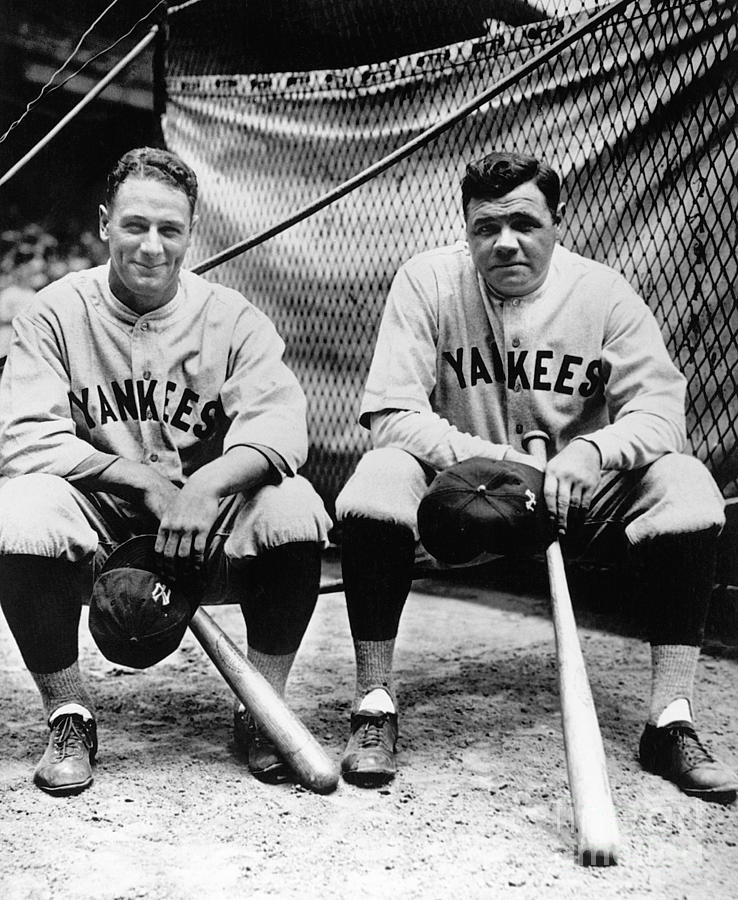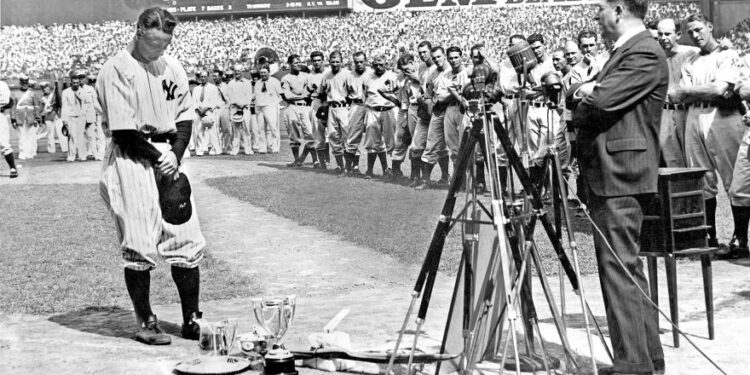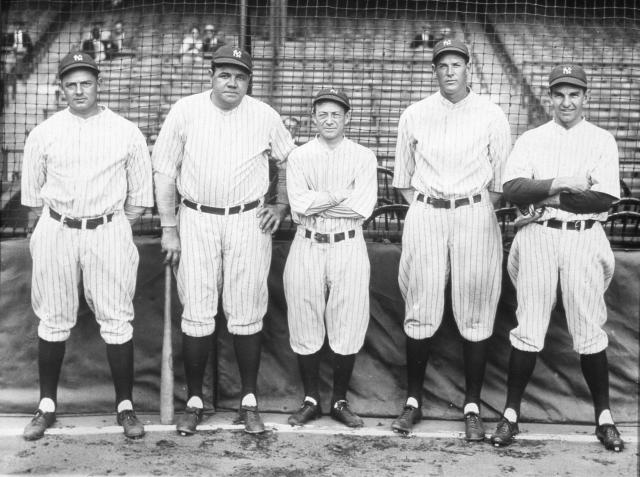By: Zachary Draves
He was first the captain of the New York Yankees who became the luckiest man on the face of the earth.
In more ways than one, Lou Gehrig was indeed lucky. Certainly his baseball skills were due to his own blistering endurance, but he was lucky enough to be able to show off those skills at the right time.

(Courtesy: Mark Rucker/Transcendental Graphics, Getty Images)
He was there when the Yankees were starting to become baseball’s greatest franchise.
From the start of his first year in 1925, when he replaced Wally Pipp at first base, Gehrig was a major factor in the Yankees winning six World Series titles over the course of his 14 year career.
He was also part of the legendary 1927 “Murderer’s Row” team that won 110 games, considered by many to be the greatest baseball team ever assembled.
(Courtesy: Transcendental Graphics/Getty Images)
Gehrig was one of the most dynamic players of his day. A true athlete with the physique of an Olympian. A beautiful yet powerful swing that looked like he was hitting a golf ball. A quickness on the base paths that perfectly reflected his athleticism.
He was often shy and quiet, a stark contrast to the boisterousness of teammate Babe Ruth, with whom he shared a tempestuous relationship at best.

(Courtesy: The National Baseball Hall of Fame and Museum)
Later on, he shared the field with Joe DiMaggio. They were similar in temperament, but DiMaggio held the edge with his charisma and mystique.

(Courtesy: Photo File/MLB Photos via Getty Images)
Nevertheless, Gehrig was humble and didn’t seek out the spotlight. He was a simple man who just wanted to do his job every single day.
Boy did he ever.
He is best known for never missing a game over the course of 14 seasons. He played in 2,130 consecutive games, a feat that went unchallenged for 56 years, before Cal Ripken Jr. surpassed him in 1995.
But in 1939, Gehrig was not the same player that he once was.
He had trouble hitting and uncharacteristically flub routine plays at first base.Gehrig knew something was wrong, but he still made the most of it in an attempt to continue doing his job.
Then on May 2, Gehrig asked Yankee manager Joe McCarthy to remove him from the lineup before a game against the Detroit Tigers. Gehrig then took the lineup card out to home plate and his incredible streak ended.
(Courtesy: Detroit Public Library/Ernie Harwell Collection)
Yankee teammate Babe Dahlgren took his place at 1st base. Over the course of the team, he tried to convince Gehrig to play, but to no avail.
Gehrig then went to the Mayo Clinic where he was diagnosed Amyotrophic Lateral Sclerosis (ALS), a rare and devastating disease that attacks the body’s nerve cells in the brain and spinal cords, which would eventually bear Gehrig’s name.
Then on July 4th, the Yankees held a special day in Gehrig’s honor, fitting for a hero to be recognized on a day for heroes. In attendance were Babe Ruth, members of the 1927 murder’s row team, the current Yankee team, and then New York Mayor Fiorello La Guardia.

(Courtesy: Cincinnati Museum Center/Getty Images)
Before 62,000 fans at Yankee Stadium, Gehrig walked to the microphone and delivered what can only be described as one of the most heart wrenchingly displays of oratorical genius.
The line that everyone knows is “today I consider myself the luckiest man on the face of the earth”.

(Courtesy: Youtube)
He later expressed gratitude for playing for the Yankees. He thanked the rival New York Giants for sending him a gift. He offered words of affection for his family including his beloved wife Eleanor.
Then he closed with a message of optimism: “I might have been given a bad break, but I got an awful lot to live for.”
“I think Lou Gehrig’s speech is probably the greatest in American sports history, and it is one of the top 10 in all of American history, in my slightly biased opinion,” said Jonathan Eig, author of the 2005 book Luckiest Man: The Life and Death of Lou Gehrig in an interview with Team NBS Media. “It is a great speech and an important speech because it is sincere, humble and so human. It reminds us that we will all face struggle, we will all face weakness, we will all face death, but we have a choice about how we face those things.”
On June 2, 1941, Gehrig died at the age of 37.
In death, Gehrig would be immortalized as the “Iron Horse” for setting an unprecedented standard of consistency by never missing a day on the job.

(Courtesy: Bettmann Archive)
His speech spoke in many ways to the nature of the human experience, which explains its longstanding resonance.
“Gehrig says he is lucky not because he has this fatal disease obviously, but because he lived this great life filled with friends and family and baseball and people who loved him,” said Eig. “That makes him lucky, and death can’t take those things away. It’s a speech that inspires us all to look at the blessings in our lives, even as we lose them.”
Lou Gehrig, through quiet dignity, was the exemplar of greatness through graciousness.


 NFL
NFL







